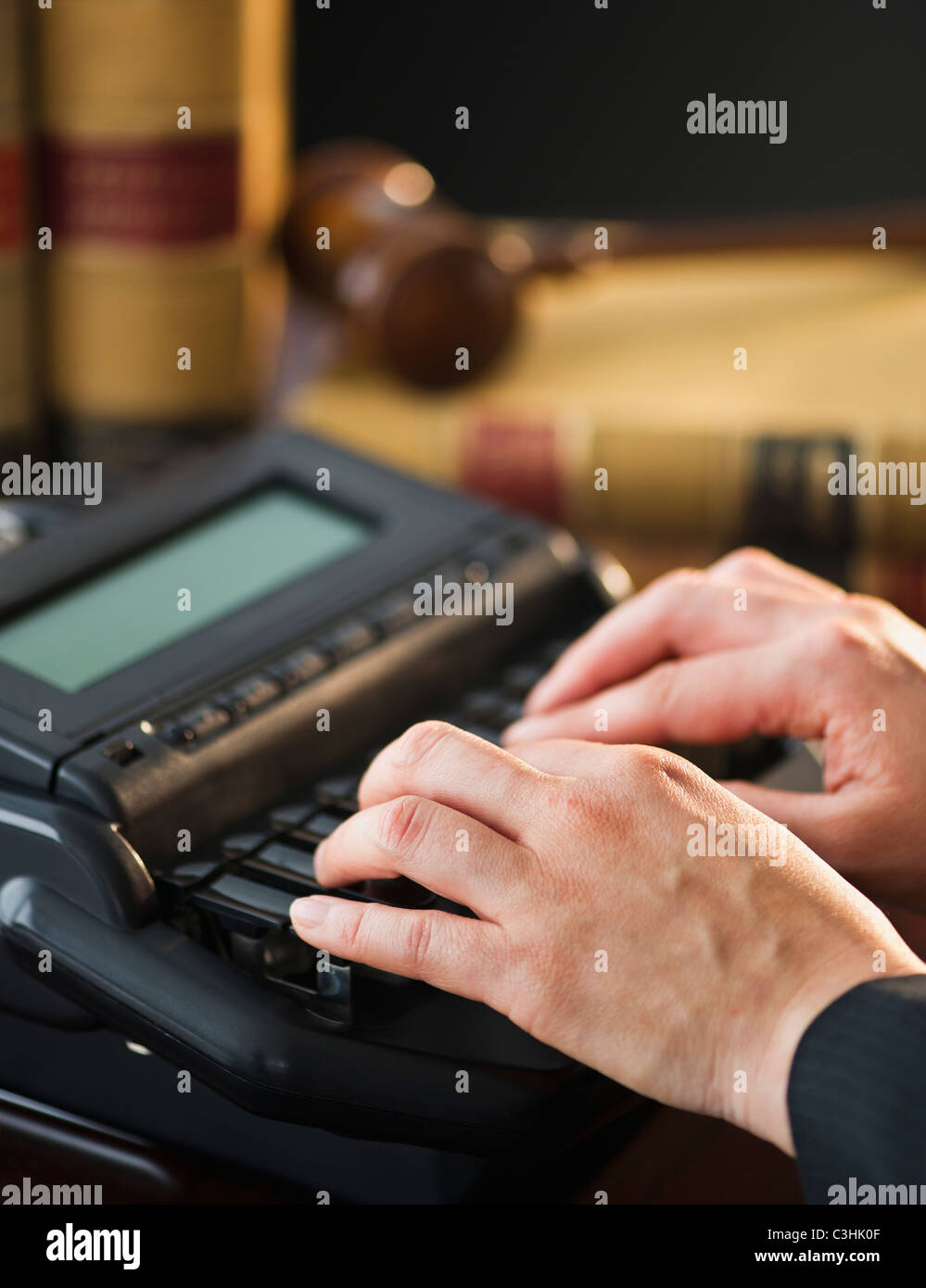Court Typist Training Programs You Should Consider
Court Typist Training Programs You Should Consider
Blog Article
Checking Out the Day-to-Day Responsibilities of a Court Typist in the Judicial System
As you navigate the elaborate world of the judicial system, you might discover yourself curious concerning the duty of a court typist. This placement is greater than just inputting; it entails capturing every word spoken throughout proceedings with precision. Every day presents special challenges and obligations that are important for maintaining the integrity of legal documents. Comprehending what a court typist does can disclose insights into the wider workings of justice. What does it require to succeed in this role?
Overview of the Court Typist Function
As you enter the function of a court typist, you'll discover it is important to understand the important responsibilities involved. You'll offer as an important web link in the judicial process, guaranteeing that all talked words during court procedures are properly caught and recorded. Your job supports the integrity of the legal system, making your interest to information imperative.You'll run specialized transcription equipment, converting audio recordings right into composed records. Recognizing with legal terms and court procedures is crucial, as you'll commonly run into complicated language and jargon.You'll additionally need to maintain discretion and manage sensitive details with treatment. Your duty requires you to function effectively under stress, typically with tight target dates, while remaining concentrated on creating clear, precise records. As a court typist, you play a vital role in protecting the official record of court procedures, contributing significantly to the total functioning of the judiciary.

Secret Obligations of a Court Typist
While you'll commonly be focused on catching talked words throughout court procedures, your crucial responsibilities as a court typist extend much past transcription. You'll prepare and keep precise documents of court tasks, ensuring they mirror every information of the proceedings. You'll additionally layout files, such as lawful briefs and summons, sticking to strict standards and deadlines.In addition, you'll arrange and manage instance files, making it less complicated for judges and lawyers to accessibility important info swiftly. You're expected to proofread and modify transcripts for quality and precision, which is important for the integrity of legal proceedings.Moreover, you'll work closely with judges, staffs, and attorneys, preserving open interaction to deal with any kind of disparities or requests. Your function is critical in making certain that the judicial process runs efficiently, offering a reputable composed account of what takes place in the court room.
Important Skills for Court Typists
As a court typist, you need to master both inputting rate and accuracy to stay on top of the demands of the court. Knowledge with legal terms is also crucial, as it guarantees you accurately catch the procedures. These skills not only boost your efficiency but likewise add to the general effectiveness of the lawful process.
Keying In Rate and Accuracy
Entering speed and accuracy are necessary abilities that every court typist need to grasp to guarantee the honesty and effectiveness of legal documentation. You need to type swiftly yet very carefully, as also minor errors can lead to considerable misconceptions in legal contexts. A high keying rate allows you to keep up with hectic court process, guaranteeing that every word is captured properly. Practicing regularly can assist you boost your speed, while concentrating on precision helps in reducing mistakes. Using devices like dictation software application or text expanders can additionally enhance your effectiveness. Bear in mind, your duty is crucial in preserving accurate records, so developing these skills not just benefits you yet likewise supports the entire judicial process.
Lawful Terms Effectiveness
Understanding legal terminology is necessary for court typists to guarantee exact and efficient documentation. You need to acquaint yourself with various legal expressions, jargon, and ideas frequently made use of in court process. This knowledge aids you record recordings and draft papers with accuracy. When you understand terms like "complainant," "accused," and "subpoena," you'll decrease the opportunities of mistakes that might endanger legal proceedings.Additionally, being skilled in legal terms boosts your confidence while working along with judges, lawyers, and various other lawyers. You'll discover it easier to comply with discussions and precisely capture the significance of what's being said. court typist. Constant knowing and method will certainly improve your skills, making you an important asset in the judicial system
Devices and Technology Utilized by Court Typists
As a court typist, you rely on different tools and technology to perform your tasks effectively. You'll require crucial typing tools, user-friendly software applications, and audio transcription devices to equal the demands of your job. Let's explore how each of these parts plays a critical duty in your day-to-day tasks.
Necessary Typing Devices
While court typists rely heavily on their abilities, the appropriate equipment is important for performance and precision. To start with, a high-quality key-board is vital for accurate and quick inputting, permitting you to equal court room procedures. Ergonomic layouts can aid stop strain throughout lengthy sessions. A trustworthy computer with adequate handling power guarantees smooth procedure, specifically when handling huge documents (court typist). You'll additionally need a good printer for creating clear copies of transcripts. Noise-canceling earphones can be useful during recordings, aiding you concentrate on audio clarity. Additionally, a comfy chair and a well-organized office advertise performance. With the right devices, you can improve your keying capabilities and support the judicial procedure properly
Software Application Applications Made Use Of
To efficiently record court process, you'll count on a series of specialized software application applications developed for accuracy and speed. These programs commonly consist of data processing software, which helps you format documents quickly and correctly. You'll additionally make use of legal-specific software that helps in handling situation documents and maintaining documents, ensuring you can easily access important information.Another crucial tool is more real-time transcription software application, enabling you to produce transcripts as the process unravel. Furthermore, you may utilize record administration systems to arrange and obtain documents effortlessly. With these applications, you'll enhance your performance and preserve the high criteria required in the judicial system, permitting you to focus on your keying abilities and the job available.

Audio Transcription Tools
Court typists frequently rely upon a variety of audio transcription tools to enhance the accuracy of their work. These tools help you convert talked words into composed message efficiently. You might use software program like Dragon NaturallySpeaking or Otter.ai, which offer voice acknowledgment capabilities, enabling for fast transcription. Furthermore, audio playback devices allow you to listen to recordings consistently, guaranteeing you catch every detail correctly. Some court typists likewise utilize foot pedals, letting you control audio playback hands-free while you kind. This combination of innovation find this not only speeds up the transcription procedure but additionally reduces errors. Familiarizing on your own with these tools can considerably enhance your performance and the quality of your transcriptions in the busy judicial atmosphere.
Challenges Dealt With by Court Typists
Although many may watch the function of a court typist as simple, you'll quickly find that it comes with a distinct set of challenges. One major obstacle is the fast lane of court procedures. You'll require to stay on par with rapid discussions, which can be intimidating, particularly when several speakers are included. Furthermore, the lawful lingo used in court can be strange and complicated, requiring you to regularly discover and adapt.Another difficulty is the pressure of tight due dates. You frequently need to produce transcripts rapidly, which can cause tension and potential errors. Moreover, keeping focus for extended periods is essential, as also a brief lapse can influence your work.Lastly, handling private information means you have to always prioritize protection and discernment, adding an additional layer of duty to your role. Stabilizing these difficulties becomes essential for anyone in the setting of a court typist.
The Importance of Precision and Focus to Information
Precision and focus to information are important for court typists, as also minor mistakes can result in significant misconceptions in lawful procedures. You are in charge of recording court hearings, legal records, and other necessary information, where every word matters. A basic typo or lost spelling can change the definition of a statement, possibly influencing the end result of a case.When you concentrate on accuracy, you aid preserve the stability of the judicial system. Your careful work sustains Visit This Link attorneys, courts, and customers by giving clear and accurate records. Attention to information additionally reduces the threat of costly delays and guarantees that all events involved have accessibility to reliable documents.
Job Course and Opportunities for Court Typists
Understanding accuracy and attention to detail not just improves your present duty yet likewise opens up doors to numerous job courses for court typists. As you obtain experience, you might consider advancing to settings such as legal assistant or management assistant in law office, where your skills in transcription and document management will certainly be invaluable.You can also discover opportunities in court reporting, which typically needs extra training but offers an opportunity to engage more directly with court proceedings.If you delight in the management side, settings in case management or legal study can be a wonderful fit.With further education and learning, you may even become a legal assistant, aiding legal representatives with instance preparation.Networking with legal experts can help you discover hidden opportunities.Ultimately, your structure as a court typist outfits you with abilities that are commonly appropriate throughout the lawful landscape, leading the way for a meeting job.
Often Asked Questions

What Certifications Are Needed to Become a Court Typist?
To become a court typist, you'll require solid inputting skills, knowledge of legal terminology, and interest to detail. A senior high school diploma is typically called for, and accreditations in transcription can enhance your credentials.
Exactly how Does a Court Typist Handle Secret Information?
You take care of secret information by complying with stringent protocols, utilizing protected systems, and keeping discernment. You're trained to identify delicate information and ensure it's stored and shared only with accredited employees, protecting the stability of the info.
What Is the Common Workplace for Court Typists?
You'll normally discover court typists in a formal workplace setting, often bordered by lawyers. The atmosphere's generally peaceful, concentrated, and structured, permitting you to focus on recording and handling delicate files effectively.
Are Court Typists Required to Take Dictation Throughout Trials?
Yes, court typists commonly take dictation during tests. You'll need to listen carefully, transcribing legal process precisely and efficiently. Your emphasis and speed will guarantee that every detail is captured for authorities records.
How Do Court Typists Handle Deadlines During Busy Durations?
Throughout hectic periods, you prioritize jobs by arranging your work and making use of reliable keying techniques. You set sensible due dates, interact with coworkers, and stay concentrated to assure all papers are completed accurately and promptly. While you'll typically be focused on capturing spoken words during court procedures, your essential responsibilities as a court typist expand far past transcription. Typing rate and accuracy are crucial skills that every court typist need to grasp to ensure the integrity and performance of lawful documents. Understanding lawful terms is important for court typists to assure reliable and accurate documents. Precision and focus to detail are important for court typists, as even minor blunders can lead to substantial misconceptions in lawful procedures. court typist. To come to be a court typist, you'll need strong keying skills, knowledge of legal terms, and attention to detail
Report this page